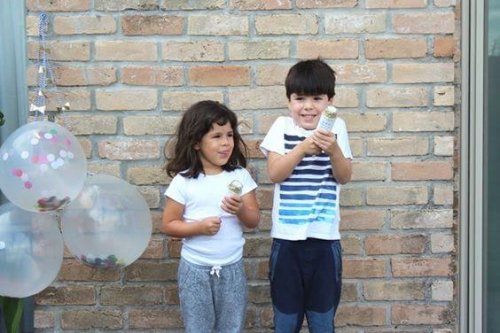How to Make Your Firstborn Child Not Feel Less Important

When a new baby comes home, we know that most of our time will be focused on them. In this article, we’ll explain how to make your firstborn child not feel less important.
The firstborn is a very special child because mom and dad receive them with great enthusiasm and shower them with attention and constant demonstrations of unconditional love.
With your firstborn child, you become parents, as you undertake a role that you’d never encountered before. This means that when a second baby arrives, the tests will be repeated, but everything will be different. Not only because you have a little more experience and maturity but also because you have to give special care to your firstborn child, who will need it more than ever.
It’s normal for your older child to feel a little jealousy, and this should be totally acceptable, as your attention will now be shared and the new member of the family will need a little more attention and dedication.
This is why we must involve your firstborn child from the moment you know you’re pregnant and explain to them that after their little brother is born, they’ll need a lot of care and attention and that they can collaborate in this beautiful task. This way, the bonds of love will begin to be created.
How to get your firstborn child to accept their little sibling?

Many thoughts can cause us confusion: “My oldest child is my life, but my second one is, too”, “My first child’s used to their parents giving all their attention to them, but my second child needs us, too, and it definitely doesn’t work if dad takes care of one and mom takes care of the other”.
The lack of fairness and deficient family integration could trigger important psychological problems in your child. This can produce an indifferent attitude, and if we don’t solve it in time, it could be very difficult to amend it.
Some recommendations
So, c onsider each of the following recommendations to ensure that your firstborn child doesn’t feel less important:
- Balance. We shouldn’t make the mistake of paying more attention to the older child because we believe they’ll be the most affected by the arrival of their little sibling. Certainly, the older sibling may feel a level of jealousy but that doesn’t mean they should monopolize all your attention.
- Fairness. Both need to learn and understand that they’re siblings and therefore will be loved equally. It should be ensured that each one has their space and time. No matter how busy you are, activities with your firstborn child shouldn’t be neglected.
- Opportunity. As soon as you have the news that you’ll be parents again, it’s mandatory that you talk to your older child about the arrival of their sibling, the love they should have for each other, and the love of parents for all their children. The idea with this is to make them feel important regardless of who was born before or after.
- Advance the scenarios. Children are very good at making analogies and they learn through them. So you could look for movies and books that deal with the subject of a baby coming home. Or even go visit a relative with young children to get a feel for the experience.
- Dialogue. Everything leads to dialogue. Even when they’re very young, children have the ability to understand and comprehend everything according to their stages. Tell them that they can talk to you about what they’re feeling. Perhaps their fears will come to light and you can help them regain confidence.
- No comparison. A common mistake parents make is “comparison”. It’s not healthy for any child to feel compared or to hear phrases like: “your older brother does it better”, even when we know each one’s strengths and weaknesses.
- Take care of your words. You must be careful with the words you say, as your children may draw the wrong conclusions. Speak responsibly and avoid making them feel guilty and inferior.
You might be interested in: 54 Phrases to Dedicate to Siblings

Things to keep in mind
Perhaps with the new baby, everything will seem more complicated. Two children of different ages, meals at home, more responsibilities, everything’s doubled. But you shouldn’t make your firstborn child feel bad about it. If you do, you’ll indirectly send an inappropriate message.
Usually, everything that the older child leaves behind (toys or clothes) is passed on to the younger one. Be careful with this! It’s reasonable for economic reasons, but it can create sibling rivalry. On the one hand, your older child may have a hard time parting with their beloved belongings. But, what’s more, your second d child may feel that they don’t have the right to new things that please them. So, try to create balance and prevent these feelings as much as possible.
Parents don’t have a manual to be perfect, but we do have enough conscience not to create two prototypes of children in our homes. Each one of them will be unique and unrepeatable, as is every birth. Balance, love, and not making comparisons are the keys.
All cited sources were thoroughly reviewed by our team to ensure their quality, reliability, currency, and validity. The bibliography of this article was considered reliable and of academic or scientific accuracy.
- Arranz Freijo, E. B. (2000). Interacción entre hermanos y desarrollo psicológico: una propuesta educativa. Innovación educativa. https://redined.educacion.gob.es/xmlui/handle/11162/70217
- Fernández, A., Gamarra, A., Izal, C., Betelu, M., & Pamplona, E. (2001). La familia ante los celos infantiles: pautas y orientaciones. Recuperado de http://www. clinicajuandeborbon. com/CELOS% 20INFANTILES. pdf.
- Monzo Climent, E. (2017). Análisis de los factores predisponentes en los celos infantiles (Doctoral dissertation). https://riucv.ucv.es/handle/20.500.12466/1547
- Vega-Rodríguez, A. M. (2015). Los cuentos de los Hermanos Grimm y el valor educativo en la literatura infantil.